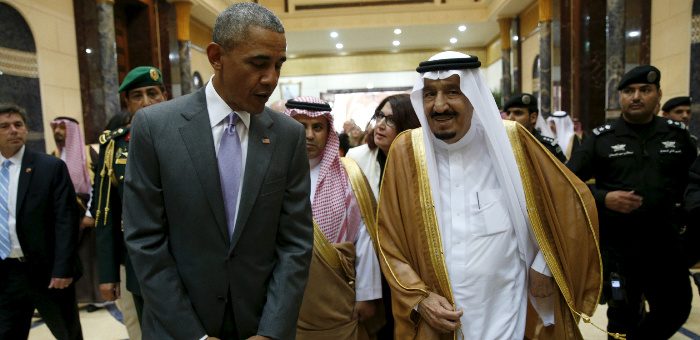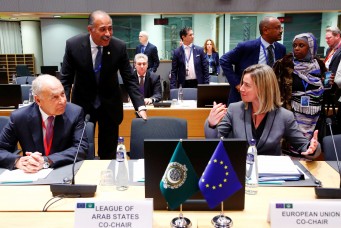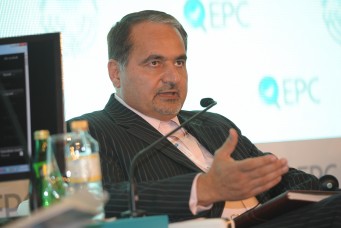Security Still Trumps Democracy in U.S.-Arab Alliances
Relations between the U.S. and its traditional Gulf allies remain firm, despite new tensions.

U.S. President Barack Obama and Saudi King Salman at a summit meeting in Riyadh. Apr. 20, 2016. Kevin Lamarque/Reuters
The deployment of a small number of U.S. special forces to Yemen, announced earlier this month, has begun offering intelligence and logistical support for the United Arab Emirate’s so-far successful push on the ground against Al-Qaeda in the Arabian Peninsula (AQAP). The deployment has reportedly involved land, air, and naval assets for a concerted effort to directly assist and compliment Emirati forces in their fight against AQAP forces in south Yemen. This coordination may well be the most tangible point of agreement resulting from the summit held between the United States and the Gulf Cooperation Council (GCC) in Riyadh in April. Agreeing to disagree on almost all other issues on the agenda, relations between Washington and its Gulf allies seem destined to return to benign continuity—a traditional focus on security—at least for the remainder of the Obama administration’s time in office. Both sides, while still mistrustful of each other, prefer to brush aside their differences and push ahead with security cooperation.
The summit reaffirmed a preexisting U.S. commitments to defend Gulf countries from foreign threat, expressed shared views on regional stability, and a hope that the peace talks already underway would end the war in Yemen. On Syria, Iran, and democracy in the Middle East, this summit was more a check-this-box exercise rather than an occasion for an honest exchange of views and a serious attempt to come to a new understanding on regional strategy.
According to the joint communique after the summit, “The leaders expressed solidarity with the Syrian people and emphasized the importance of the full implementation of UN Security Council Resolution 2254, to include immediate humanitarian access to besieged and hard-to-reach areas.” This general statement glosses over the fact that there was no agreement on a new strategy to counter the continued Al-Assad regime push to retake Aleppo and close the one remaining path the opposition has to the Turkish border. For some time, Gulf countries have wanted the United States to provide the opposition with qualitatively superior weapons to the ones they currently have, a proposition to which President Barack Obama remains opposed.
To be sure, the United States and NATO have upped their game in Syria. The U.S. has built a base in Kurdish-controlled northern Syria and dispatched a small number of special forces to bolster the Syrian opposition. These moves, however, have remained focused on fighting the Islamic State in Iraq and Syria (ISIS) and are doing precious little to support the Syrian opposition against the Al-Assad regime—frustrating GCC expectations in this regard. In the meantime, Al-Assad with Russian backing has continued to push his strategic advantages on the ground against his opposition. The Geneva peace talks continue to be a source of contention. The desired focus on the future of President Bashar Al-Assad by the GCC and Syrian opposition has already been rejected, or explained away by Secretary of State John Kerry as a matter to be deferred to such a time when the Syrian people can have a genuinely free and fair election, the result of which—according to Kerry—would be bound to jettison Al-Assad.
Obama has continued to encourage GCC leaders to be more forthcoming in assisting the Sunnis of Anbar and working with the Iraqi government against ISIS. In response, a GCC envoy has recently been sent to assess the needs of the Sunni community in Iraq, but the Gulf countries are not likely to even try ameliorating Sunni-Shia tensions, given that they are not perceived as neutral on these issues. In any case, there is not much they can do in the face of continued Iranian intervention in Iraq.
In Yemen, Saudi Arabia continues its costly involvement in the war, with tacit U.S. acquiescence and logistical support. Obama has complimented the Saudis on the recent peace initiative, choosing to coax rather than pressure the Saudis into a cessation of hostilities and an all-out effort to reach a peace agreement. The Riyadh and Kuwait meetings, however, between the Houthis and Saudi officials in the first case, and Houthis and the government of President Abdu Rabbu Mansour Hadi in the second, have not seen any input from the U.S. beyond the moral support aready offered. The U.S. does not seem interested in what formula is finally adopted for Yemen and, given how distrusted the Houthis are in Riyadh, the talks could founder over the complex nature of the war and the thorny issues that divide all Yemenis, north and south.
Broadly, Gulf countries and the United States, while sometimes aligned, have not held the same long-term goals in the wake of the Arab uprisings and resurgent oppositional movements. In Egypt, the U.S. was willing to work with the Muslim Brotherhood when they won a free and fair election. Saudi Arabia was not and, contrary to Washington’s position, it poured in billions of dollars after the military coup overthrew the Muslim Brotherhood. From an American perspective, President Abdel Fattah El-Sisi’s dubbing the Muslim Brotherhood a terrorist organization, and pursuing their members with vengeance all across Egypt, has been a dangerous exercise likely exacerbating the spread of ISIS, a far more dangerous organization.
Human rights abuses have mounted in Egypt to levels not seen during the Mubarak era raising alarms internationally. There is no indication that the divergent perspectives on Egypt ever came up during the GCC summit. Rather, the U.S. has continued military assistance to Egypt under El-Sisi and has just concluded an $80 billion arms deal with Saudi Arabia. In other words, its back to business as usual. Security policy has trumped democracy.
Restoring relations with Iran has been a strategic goal for Obama from day one in the White House. In an interview with the Atlantic, he reiterates that Saudi Arabia must learn to work with Iran. Saudi Arabia continues to view Iran as the main threat to its security and that of the region as a whole. There is no sign that the Riyadh summit succeeded in bridging the gap between American and Saudi views on Iran.
As the Obama administration nears the end of its term, a resignation has set in that perhaps the lofty ideals associated with Obama’s Cairo speech in 2009 and his Middle East policy address that followed at the Department of State in 2011 were not realistic goals afterall. Instead, a return to a narrower definition of national security has prevailed—one that focuses on blunting the spread of international terrorism thought by Obama to directly threaten the United States, while relying primarily on the same friends and allies with whom previous administrations have collaborated.
Nabeel Khoury is non-resident senior fellow with the Rafik Hariri Center for the Middle East at the Atlantic Council. He spent twenty-five years as a diplomat in the U.S. foreign service, serving in various posts including: deputy chief of mission in Yemen; consul general in Casablanca; deputy director of the State Department Media Outreach Center in London; and director of the Near East South Asia Office of the State Department’s Bureau of Intelligence and Research. In 2003, during the Iraq war he served as State Department spokesperson at U.S. Central Command in Doha and in Baghdad. He has contributed to the Middle East Journal, Journal of South Asian and Middle Eastern Studies, International Journal of Middle East Studies, and Middle East Policy. On Twitter:@khoury_nabeel.
Subscribe to Our Newsletter





